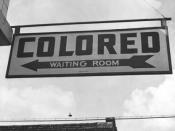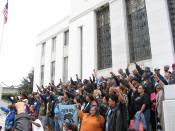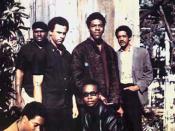The word Rage can be simply defined as: violent, explosive anger. As we study the Civil Rights Movement, rage used by many Negro leaders as a catalyst of rhetorical achievement are valued even today. The writings of Malcolm X, Stokely Carmichael, and Martin Luther King exemplify the ideology behind the meaning of rage by either emphasizing its importance to the movement or its relevance as an end result. During the sixties we see examples of this and as a result many discrete audiences are influenced in a tornado-like effect where they are surrounded by the rhetoric.
It is highly important to understand the idea of where Black Power and Black Pride originated from, and the ideology that blacks as human beings must demand unconditional equality. Nevertheless, this demand for equality produces a channel of rage. In his 1967 speech "The Meaning of Black Power", Franklin Florence defines Black Power as "an active attitude...."
And I say tonight, freedom and justice are not gifts -- you must take them -- rise up, you mighty black people -- organize and take power." It is true that Black Power was developed by a variety rhetorical rage during the Civil Rights Movement, but the question we must ask is where did it come from? Leroi Jones (Amari Baraka) states that is stems from the separatist philosophy of Garveyism. "Black Power cannot exist WITHIN white power. One or the other, there can only be one or the other. They might exist side by side as separate entities, but never in the same space. Never! They are mutually exclusive." The decision, according to some, has to be made as to which one will prevail. Rage, as is evident, has neither subsided nor been appeased. Nor has the momentum to overcome ceased from pressing upward against...


